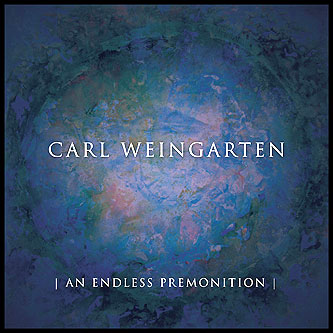 San
Francisco Bay area electric guitar icon Carl Weingarten has
taken the guitar to some strange and beautiful places these past 30+
years but none more strange or beautiful than on his 2016 CD, An
Endless Premonition. On An Endless Premonition,
Weingarten’s guitar is wonderfully captured on CD and the
mastering by Myles Boisen is most impressive. Paired with
Michael Manring on two tracks, on the 54 minute, five part
An Endless Premonition, Weingarten paints some truly
metaphysical and sonically-induced guitar soundscapes in a futuristic
sounding setting. Speaking about his new CD, Carl tells mwe3.com,
'My intention was to explore a new direction, at least from my
last few releases. I had been thinking about a solo electric guitar
project for a few years, but I’d been reluctant as there are
so many artists using loop pedals now. I didn’t want to approach
a project like this until I was confident I had something new to say.
The title is a reference to the call and response going on within
the music. Every note I play echoes back as an orchestration, rather
than a clone of the original phrase. I respond to that and the music
just keeps developing.' Some
sonic references might be to Eno’s famous work Apollo, with
guitarist Dan Lanois—especially as Carl's latest CD features
his lonesome sounding guitar wailing in the cosmos. A renowned photographer
and a legendary guitar innovator / composer, Carl Weingarten presents
five fascinating sonic snapshots of his current musical life on An
Endless Premonition. www.mphase.com
San
Francisco Bay area electric guitar icon Carl Weingarten has
taken the guitar to some strange and beautiful places these past 30+
years but none more strange or beautiful than on his 2016 CD, An
Endless Premonition. On An Endless Premonition,
Weingarten’s guitar is wonderfully captured on CD and the
mastering by Myles Boisen is most impressive. Paired with
Michael Manring on two tracks, on the 54 minute, five part
An Endless Premonition, Weingarten paints some truly
metaphysical and sonically-induced guitar soundscapes in a futuristic
sounding setting. Speaking about his new CD, Carl tells mwe3.com,
'My intention was to explore a new direction, at least from my
last few releases. I had been thinking about a solo electric guitar
project for a few years, but I’d been reluctant as there are
so many artists using loop pedals now. I didn’t want to approach
a project like this until I was confident I had something new to say.
The title is a reference to the call and response going on within
the music. Every note I play echoes back as an orchestration, rather
than a clone of the original phrase. I respond to that and the music
just keeps developing.' Some
sonic references might be to Eno’s famous work Apollo, with
guitarist Dan Lanois—especially as Carl's latest CD features
his lonesome sounding guitar wailing in the cosmos. A renowned photographer
and a legendary guitar innovator / composer, Carl Weingarten presents
five fascinating sonic snapshots of his current musical life on An
Endless Premonition. www.mphase.com
mwe3.com
presents an interview with
CARL WEINGARTEN
An Endless Premonition – The Interview
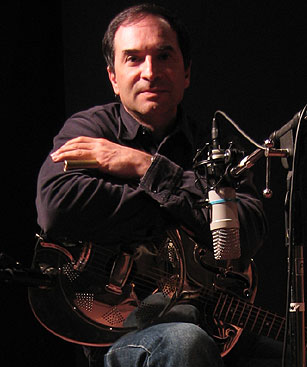 mwe3:
Your 2016 album An Endless Premonition is very different sounding.
I think it’s a very unusual sounding, in a good way for an instrumental
guitar album. What did you set out to achieve, musically, with An
Endless Premonition ?
mwe3:
Your 2016 album An Endless Premonition is very different sounding.
I think it’s a very unusual sounding, in a good way for an instrumental
guitar album. What did you set out to achieve, musically, with An
Endless Premonition ?
Carl Weingarten: I’m really glad you like the CD, Robert.
My intention was to explore a new direction, at least from my last
few releases. I had been thinking about a solo electric guitar project
for a few years, but I’d been reluctant as there are so many
artists using loop pedals now. I didn’t want to approach a project
like this until I was confident I had something new to say.
mwe3: How did you come up with An Endless Premonition
as the title?
Carl Weingarten: The title is a reference to the call and response
going on within the music. Every note I play echoes back as an orchestration,
rather than a clone of the original phrase. I respond to that and
the music just keeps developing.
mwe3: Is there something uniquely foreboding about the title
and cover art, which looks like some kind of vortex, hopefully not
a hurricane vortex...
Carl Weingarten: There is a darkness to the music, but I see
beauty in darkness. The artwork on the cover is a painting by Nicole
Wakeman. She creates beautiful and brightly colored abstract images
that often contain geometric shapes. I thought her style of painting
and the music had a lot in common. The graphic artist who produced
the CD jacket ended up muting the colors to emphasize the circle in
the center. The overall look is darker than what I originally wanted,
but it still works. No foreboding implied.
mwe3: On An Endless Premonition, was there a lot of
manipulation of the sounds to achieve such amazing delays and sustained
sounds?
Carl Weingarten: Each track on the CD was recorded in a single
take, recorded directly off my pedal rig. There are no overdubs, except
for Michael Manring who later added bass on two songs. For the sustained
tones I used a guitar compressor and extended repeats, mixed low,
on the delays. Most of the guitar tones are dry with little or no
distortion, which was not my usual sound. I’ve been a fuzz-toner
since I first began playing electric guitar, but in this context I
needed clean long tones to make this work. Distortion alone doesn’t
create sustain. It just breaks up the signal, in beautiful ways. But
clean compression was the key for this music, not unlike how pedal
steel guitar sounds.
mwe3: It’s hard to know where these songs begin and end.
Carl Weingarten: Flow is everything in ambient music. If you’re
going to invite people into a reflective listening experience, and
if you want to keep them involved, there has to be movement. Repeating
loops, even with some decoration, will get boring and even annoying
after some point. Movement means change, and the slow transitions
that take place in these songs are like bends in the road.
 mwe3:
What was the recording process like?
mwe3:
What was the recording process like?
Carl Weingarten: The first couple of weeks were devoted to
sitting down and playing whatever came to mind. I wanted to capture
the music spontaneously while the concept was still fresh. I’m
glad I made that decision, because after a point I started to settle
in and began the inevitable overthinking. Luckily by that point, I
had the tracks I needed.
mwe3: You’re a great believer in live music in a performance
setting, so was most of An Endless Premonition cut live and
then edited and even tweaked more?
Carl Weingarten: I always shoot for a live feel, even in studio
recording. I like to think of each track as its own performance. The
best takes were transferred to my PC for editing. Sections I didn’t
like I removed, but kept the essential performance intact. Some effects
were added later, mostly for atmosphere, like reverb and ping-pong
delays to emphasize the stereo image.
mwe3: So, compared with Panomorphia (from 2012) and
Life Under Stars (from 2014), is An Endless Premonition
very much a solo album?
Carl Weingarten: Michael Manring plays on two cuts.
mwe3: How did you approach the collaboration on the two tracks
with Michael?
Carl Weingarten: I wasn’t sure it would work, honestly.
The music was already in the drone zone. And even though this is ambient
music, I wanted it to have a very full sound. Michael dialed right
into what I was doing. He didn’t just fill the bottom end, he
opened up the sound and essentially finished what the guitar had started.
Michael and I are now recording a follow-up to Premonition.
mwe3: You did mention that An Endless Premonition is
inspired by your early recordings, including those with your band
Delay Tactics.
Carl Weingarten: Well yes, Premonition is something
of a return to what synthesist Gale Ormiston and I were doing on our
first recordings, Submergings (1981) and Windfalls (1983),
which were produced with tape-delay. The music was very experimental,
abstract and the pieces ran as long as fifteen minutes. When Delay
Tactics began, it was two guitarists and tape machines. There was
a lot of free exploration in that music. I’ve missed the immediacy
of that experience. I wanted to see if I could tap into that again,
by writing music in the moment, that isn’t restricted to melody,
beats or length.
mwe3: What was it like working with Noah Perry and Myles Boisen,
the sound engineers who worked with you on the mixing and mastering?
Carl Weingarten: Great always. I’ve known them both for
over ten years. Noah and I have worked extensively on the last few
releases. He’s done most of the edit and mix production for me
and recorded instruments like drums or voice where I could not in
my own studio. Myles is the mastering guru. I trust his judgment,
and his shaping of the final tracks has been essential for all our
releases.
 mwe3:
The sound of An Endless Premonition is incredible, it’s
very loud and sustained yet very clean without too much saturation.
In fact, it’s totally unique in that regard. What did you tell
Noah and Myles as far as your sound instructions during the mixing
and mastering?
mwe3:
The sound of An Endless Premonition is incredible, it’s
very loud and sustained yet very clean without too much saturation.
In fact, it’s totally unique in that regard. What did you tell
Noah and Myles as far as your sound instructions during the mixing
and mastering?
Carl Weingarten: I told them “Make It loud.” The
music is not light and airy. The music has weight to it. It’s
the difference between something that’s pretty versus something
beautiful.
mwe3: Making a record like this can be very tricky but I think
you nailed it perfectly. Did you record it on your Alesis HD-24 recorder?
Even though you call your recording set-up “old school”
the sound is very much state of the art.
Carl Weingarten: I’d say the sound is more Medium-FI,
to be honest, but that’s fine for what I’m doing. I’ve
learned how to get the most out of the equipment I have. Usually I
record at my own studio, then mix and master somewhere else. I trust
myself when it comes to producing the music, but having another set
of ears makes a big difference, especially at the mix and mastering
stage.
mwe3: Were there any changes in your recording set-up on An
Endless Premonition?
Carl Weingarten: I’m doing more digital editing now.
I use to leave that for Noah because he has great skills and I could
just focus on the big picture. He lives and works in Los Angeles most
of the time now, and he was not in town for much of the production.
I’ve been using digital editors since the 1990s, but once he
and I began working together, we got more accomplished if I just played
producer and let him handle the actual work flow. I always learn best
by doing, but every session with Noah was a master class. For Premonition,
I recorded the guitar, bass and delay tracks directly to my HD24 recorder.
From there, I flew them in to the PC where I did all the editing and
mix prep. When Noah was in town, I’d bring the files over to
his studio and we’d setup and mix.
mwe3: Is the older recording equipment better than the new
ones?
Carl Weingarten: Not necessarily. I mean the electronics have
improved and the effect options are endless now, but it depends on
the kind of sound you want. Music technology is paint, brushes and
canvas. Do you prefer watercolors, oil or acrylic? It’s just
a pallet.
mwe3: Is part of the trouble that the gear gets better but
people don’t even know how to play these CDs?
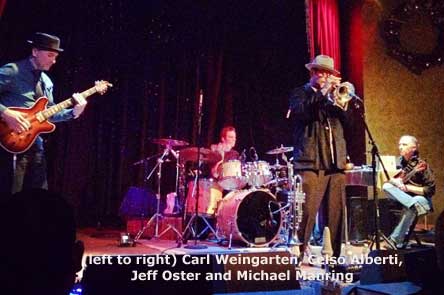 Carl Weingarten:
That’s a good question. For a long time, and up until CDs came
along, recording technology advanced at pace with music media. Music
media, whether lacquer, vinyl, tape or digital is about the market
and where/how people prefer to listen to music. So today, we have
this divergence, where the technology continues to improve, but most
listeners seem content with the 1990s technology of MP3s.
Carl Weingarten:
That’s a good question. For a long time, and up until CDs came
along, recording technology advanced at pace with music media. Music
media, whether lacquer, vinyl, tape or digital is about the market
and where/how people prefer to listen to music. So today, we have
this divergence, where the technology continues to improve, but most
listeners seem content with the 1990s technology of MP3s.
mwe3: How about guitars this time? I know you acquired a Sweetwood
guitar from the builder in Santa Cruz.
Carl Weingarten: I used the Sweetwood guitar for all the recording.
mwe3: The sound of making An Endless Premonition in
the recording studio must have been incredible. Did you use amps or
was most it recorded directly into the recorder or sound board? There’s
a great range of sound levels but it’s done very carefully.
Carl Weingarten: I did mic the amp for a couple of takes, but
the direct sound ended up working best. My amp sounded fine, but distorted
tones just weren’t right for this music. As you can tell in the
mix, the effects and the atmosphere are way up front with the guitar
sitting in the background.
mwe3: For some reason, An Endless Premonition reminded
me a lot of some of Eno’s albums from the early 1980s but your
album is even better recorded than Eno’s, say Apollo album
from the early 1980s. Did you have some sonic parameters so to speak
on An Endless Premonition or did you just roll tape?
Carl Weingarten: I had no particular parameters, except to
go for something new, something that I hadn’t heard before. Eno
was an early influence on me for sure. I don’t immerse myself
in his, or anyone else’s music, like I use to. The listening
I do is more like a checking in with the artist, just to see how their
work has changed, or not. Eno is a brilliant man, and I love his music.
mwe3: Too bad you and Eno can’t work on something together.
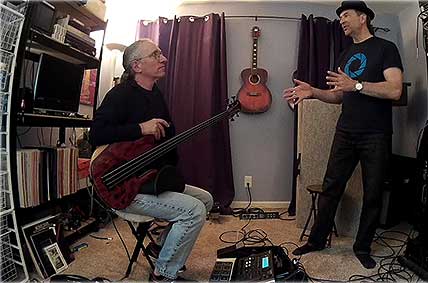 Carl
Weingarten: Me work with Eno? That would be an experience for
sure. I saw him in the ‘90s on a lecture panel in San Francisco
that included Laurie Anderson and Spike Lee. During a break, I walked
around and saw Eno standing by himself near the stage door. He seemed
relaxed and was probably very approachable at that moment, but I just
couldn’t bring myself to walk the 20 feet and say hello. I always
regretted that. But the gods were not finished with me, and some years
later I was out on a Saturday afternoon and ran into a friend. He
had an extra ticket to a pre-opening party at SFMOMA and offered it
to me. The event turned out to be for an Eno video installation, and
Eno was there. During the reception I waited until he had a free moment
and we and ended up having a short, but fun conversation. We even
shared a laugh.
Carl
Weingarten: Me work with Eno? That would be an experience for
sure. I saw him in the ‘90s on a lecture panel in San Francisco
that included Laurie Anderson and Spike Lee. During a break, I walked
around and saw Eno standing by himself near the stage door. He seemed
relaxed and was probably very approachable at that moment, but I just
couldn’t bring myself to walk the 20 feet and say hello. I always
regretted that. But the gods were not finished with me, and some years
later I was out on a Saturday afternoon and ran into a friend. He
had an extra ticket to a pre-opening party at SFMOMA and offered it
to me. The event turned out to be for an Eno video installation, and
Eno was there. During the reception I waited until he had a free moment
and we and ended up having a short, but fun conversation. We even
shared a laugh.
mwe3: It’s just amazing how much great music is coming
out the SF Bay area these days. That level of sonic experience kind
of puts the rest of the country to shame.
Carl Weingarten: The diversity of music here is amazing, but
there’s great music happening everywhere.
mwe3: Are you satisfied with the current model of the music
business or is something lacking?
Carl Weingarten: Something has been lacking for a long time
now. And there’s no going back to the music business that existed
prior to 2000. That world is gone. I know a few artists who scratch
out a living with music, but none that I know personally who live
strictly from CD sales. It’s always been the case that artists
spend much of their time looking for work, but nowadays artists spend
most of their time not only looking for work, but doing more work
for less pay.
Independents however are experimenting with new ways to encourage
music sales and gig opportunities. There is no single business model
that works for everyone. What independents are dealing with right
now are the number of large media providers pretending to be in the
music business, but who are actually just selling music files as cheaply
as possible, or providing data streams for subscription fees. I’m
not offering my music for digital downloads, except for a few single
tracks.
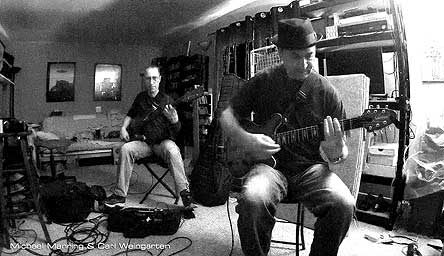 mwe3:
What do you feel can be done to improve the current “music business”
model to make music grow from the ground up and help artists succeed
once again?
mwe3:
What do you feel can be done to improve the current “music business”
model to make music grow from the ground up and help artists succeed
once again?
Carl Weingarten: It’s a huge challenge. Music is something
many people claim they can’t live without, but don’t want
to pay for. Too many musicians, especially the younger ones, keep
buying into the idea that giving away their music will advance their
careers. You have to pay your dues, but the giveaway strategy only
makes sense for a while. If you don’t value your work, no one
else will. Record shops and streaming services can’t survive
on old catalog forever. They need new music to keep customers coming
back, even if it’s just a small percent of what they sell or
broadcast. Musicians are going to have to be as creative in their
business life as they are in their music.
Streaming, broadcast and licensing is where the income is heading.
Royalty rates have to be increased. It may take some legislation,
but for the market to thrive, everyone has to win, on some level.
mwe3: What does the future hold for you and your music as we
approach 2017?
Carl Weingarten: The CD I produced with Catherine Marie Charlton,
Where There Is Light, which has been released on Spotted Peccary.
Spotted Peccary is an established independent label that’s mostly
ambient  electronic
music. They really have their act together in marketing and distribution.
I’m impressed with what they’ve done so far. I’m also
recording the second CD in the Premonition series and could
have that released by next summer. Blue Eternity (Oster-Manring-Weingarten)
is getting back together for two shows at the DeAnza Planetarium in
Cupertino this spring. And believe it or not, there’s actually
been some interest in the early Multiphase vinyl catalog. A label
in the U.K. with Juno Distribution has asked to reissue Dreaming
In Colors on vinyl. I’m looking forward to this next year.
electronic
music. They really have their act together in marketing and distribution.
I’m impressed with what they’ve done so far. I’m also
recording the second CD in the Premonition series and could
have that released by next summer. Blue Eternity (Oster-Manring-Weingarten)
is getting back together for two shows at the DeAnza Planetarium in
Cupertino this spring. And believe it or not, there’s actually
been some interest in the early Multiphase vinyl catalog. A label
in the U.K. with Juno Distribution has asked to reissue Dreaming
In Colors on vinyl. I’m looking forward to this next year.



